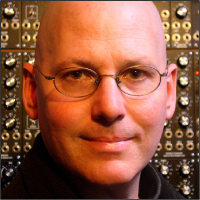Robert Rich
// composer & musicianROBERT RICH is a composer and musician from Mountain View, California. “Inner Landscapes [Live]” (1987), “Numena” (1987), “Rainforest” (1989), “Gaudi” (1991), “Geometry” (1991), “Propagation” (1994), “A Troubled Resting Place” (1996), “Below Zero” (1998), “Seven Veils” (1998), “Humidity [3CD Live]” (2000), “Somnium [DVD]” (2001), “Bestiary” (2001), “Temple Of The Invisible” (2003), “Calling Down The Sky” (2003), “Open Window” (2004), “Echo Of Small Things” (2005), “Electric Ladder” (2006), “Music From Atlas Dei” (2007), and “Illumination” (2007). Robert Rich’s discography spans over twenty years, and his music serves as a important influence on today’s ambient, electronica, and intelligent dance music. Robert Rich also maintains FlavorNotes.com, an online archive and directory for recipes and restaurants.
Website: www.robertrich.com and www.flavornotes.com
Photo: Dixie Chan / RobertRich.com
Interview:
We process music in the mirror-image regions of the brain that process language. For a right-handed person, language centers sit mostly in the left hemisphere, around the temporal lobe. Music activates similar regions in the right hemisphere, and left-handers simply invert the hemispheres. So, neurologically we can think of music as a holistic language, one that allows us to communicate non-linear, non-grammatical thoughts and feelings, directly and without the intervention of analytics or signifiers. Thus, music is perfectly suited to evoke spiritual yearning or communion, natural human tendencies.
Music is just as well suited to conveying sexual hunger, basic emotions, political propaganda, peer bonding, or materialistic consumerism. The differences derive from the intention of the artist, expectations implied by the listening environment, and the awareness or preparedness of the listener. Music almost certainly dates back to the dawn of language, when we evolved the parts of our brain that allow symbolic thinking. From this time forward, until the ascendance of Western materialism, music has formed a central part of community ritual, shamanism, healing, and a main source of power in organized religion. In these ritual contexts, the artist, the environment, and the audience conspire to experience transcendence within the music. The audience knows what the music should convey, and seeks this spirituality.
In contrast, in our current paradigm, we perceive the artist as an independent entity who serves primarily ego or commerce. Music doesn’t necessarily convey transcendence in this culture, unless of course the artist makes it clear that the intention of the work is to serve a spiritual purpose. The artist can create environments that help cue the audience to seek a heightened experience. The audience needs to understand this intention and be prepared to experience it within music, dance, painting, or film. For example, if I didn’t know that Mark Rothko was a mystic, and that his paintings attempted to convey pure conscious light, I might interpret them as pointless abstraction. Once I seek to experience the intention, the painting unfolds within me and expresses something very intense. I have to prepare myself for that experience. Music can help guide the experience of transcendence even better than a physical artwork, because it unfolds through time as a process. An object can only symbolize the immaterial. Music can directly evoke ecstatic experience, hypnotic trance, and dissolution of ego. I think our species evolved these tools to complete the range of experiences that language and objects can only point to. We each have psychological muscles to experience the transcendent, but we must exercise these muscles in order to make full use of them. Music can guide these excursions, but music alone is not sufficient. The listener must desire to take that journey.
“Music can directly evoke ecstatic experience, hypnotic trance, and dissolution of ego.”
– Robert Rich, composer and musician


